Children of the Albatross coti-2 Read online
Children of the Albatross
( Cities of the Interior - 2 )
Anaïs Nin
Children of the Albatross is divided into two sections: “The Sealed Room” focuses on the dancer Djuna and a set of characters, chiefly male, who surround her; “The Cage” brings together a case of characters already familiar to Nin’s readers, but it is their meeting place that is the focal point of the story.
Anaïs Nin
CHILDREN OF THE ALBATROSS
THE SEALED ROOM
STEPPING OFF THE BUS at Montmartre Djuna arrived in the center of the ambulant Fair and precisely at the moment when she set her right foot down on the cobblestones the music of the merry-go-round was unleashed from its mechanical box and she felt the whole scene, her mood, her body, transformed by its gaiety exactly as in her childhood her life in the orphan asylum had been suddenly transformed from a heavy nightmare to freedom by her winning of a dance scholarship.
As if, because of so many obstacles her childhood and adolescence had been painful, heavy walking on crutches and had suddenly changed overnight into a dance in which she discovered the air, space and the lightness of her own nature.
Her life was thus divided into two parts: the bare, the pedestrian one of her childhood, with poverty weighing her feet, and then the day when her interior monologue set to music led her feet into the dance.
Pointing her toe towards the floor she would always think: I danced my way out of the asylum, out of poverty, out of my past.
She remembered her feet on the bare floor of their first apartment. She remembered her feet on the linoleum of the orphan asylum. She remembered her feet going up and down the stairs of the home where she had been “adopted” and had suffered her jealousy of the affection bestowed on the legitimate children. She remembered her feet running away from that house.
She remembered her square-toed lusterless shoes, her mended stockings, and her hunger for new and shining shoes in shop windows.
She remembered the calluses on her feet from house work, from posing for painters, from working as a manneuin, from cold, from clumsy mendings and from ill-fitting shoes.
She remembered the day that her dreaming broke into singing, and became a monologue set to music, the day when the dreams became a miniature opera shutting out the harsh or dissonant sounds of the world.
She remembered the day when her feet became restless in their prison of lusterless leather and they began to vibrate in obedience to inner harmonizations, when she kicked off her shoes and as she moved her worn dress cracked under her arms and her skirt slit at the knees.
The flow of images set to music had descended from her head to her feet and she ceased to feel as one who had been split into two pieces by some great invisible saber cut.
In the external world she was the woman who had submitted to mysterious outer fatalities beyond her power to alter; and in her interior world she was a woman who had built many tunnels deeper down where no one could reach her, in which she deposited her treasures safe from destruction and in which she built a world exactly the opposite of the one she knew.
But at the moment of dancing a fusion took place, a welding, a wholeness. The cut in the middle of her body healed, and she was all one woman moving.
Lifted and impelled by an inner rhythm, with a music box playing inside her head, her foot lifted from drabness and immobility, from the swamps and miasmas of poverty, carried her across continents and oceans, depositing her on the cobblestone of a Paris square on the day of the Fair, among shimmering colored tents, the flags of pleasure at full mast, the merry-go-rounds turning like dervish dancers.
She walked to a side street, knocked on a dark doorway opened by a disheveled concierge and ran down the stairway to a vast underground room.
As she came down the stairway she could already hear the piano, feet stamping, and the ballet master’s voice. When the piano stopped there was always his voice scolding, and the whispering of smaller voices.
Sometimes as she entered the class was dissolving, and a flurry of little girls brushed by her in their moth ballet costumes, the little girls from the Opera, laughing and whispering, fluttering like moths on their dusty ballet slippers, flurries of snow in the darkness of the vast room, with drops of dew from exertion.
Djuna went down with them along the corridors to the dressing rooms which at first looked like a garden, with the puffed white giant daisies of ballet skirts, the nasturtiums and poppies of Spanish skirts, the roses of cotton, the sunflowers, the spider webs of hair nets.
The small dressing room overflowed with the smell of cold cream, face powder, and cheap cologne, with the wild confusion of laughter, confessions from the girls, with old dancing slippers, faded flowers and withering tulle.
As soon as Djuna cast off her city clothes it was the trepidating moment of metamorphosis.
The piano slightly out of tune, the floor’s vibrations, the odor of perspiration swelled the mood of excitement born in this garden of costumes to the accompaniment of whisperings and laughter.
When she extended her leg at the bar, the ballet master placed his hand on it as if to guide the accuracy of her pointed toe.
He was a slender, erect, stylized man of forty, not handsome in face; only in attitudes and gestures. His face was undefined, his features blurred. It was as if the dance were a sculptor who had taken hold of him and had carved style, form, elegance out of all his movements, but left the face unimportant.
She always felt his hand exceptionally warm whenever he placed it on her to guide, to correct, improve or change a gesture.
When he placed his hand on her ankle she became intensely aware of her ankle, as if he were the magician who caused the blood to flow through it; when he placed his hand on her waist she became intensely aware of her waist as if he were the sculptor who indented it.
When his hand gave the signal to dance then it was not only as if he had carved the form of her body and released the course of her blood but as if his hand had made the coordination between blood and gestures and form, and the lecon de danse became a lesson in living.
So she obeyed, she danced, she was flexible and yielding in his hands, plying her body, disciplining it, awakening it.
It became gradually apparent that she was the favorite. She was the only one at whom he did not shout while she was dressing. He was more elated at her progress, and less harsh about her faults.
She obeyed his hands, but he found it more imperative than with other pupils to guide her by touch or by tender inflections of his voice.
He gave of his own movements as if he knew her movements would be better if he made them with her.
The dance gained in perfection, a perfection born of an accord between their gestures; born of her submission and his domination.
When he was tired she danced less well. When his attention was fixed on her she danced magnificently.
The little girls of the ballet troupe, mature in this experience, whispered and giggled: you are the favorite!
Yet not for a moment did he become for her a man. He was the ballet master. If he ruled her body with this magnetic rulership, a physical prestige, it was as a master of her dancing for the purpose of the dance.
But one day after the lessons, when the little girls from the Opera had left and there still hung in the air only an echo of the silk, flurry, snow and patter of activities, he followed her into the dressing room.
She had not yet taken off the voluminous skirt of the dance, the full-blown petticoat, the tight-fitting panties, so that when he entered the dressing room it seemed like a continuation of the dance. A continuation of the dance when he approached her and bent one knee in gallant salutation, and
put his arms around her skirt that swelled like a huge flower. She laid her hand on his head like a queen acknowledging his worship. He remained on one knee while the skirt like a full-blown flower opened to allow a kiss to be placed at the core.
A kiss enclosed in the corolla of the skirt and hidden away, then he returned to the studio to speak with the pianist, to tell her at what time to come the next day, and to pay her, while Djuna dressed, covering warmth, covering her tremor, covering her fears.
He was waiting for her at the door, neat and trim.
He said: “Why don’t you come and sit at the cafe with me?” She followed him. Not far from there was the Place Clichy, always animated but more so now as the site of the Fair.
The merry-go-rounds were turning swiftly. The gypsies were reading fortunes in little booths hung with Arabian rugs.
Workmen were shooting clay pigeons and winning cut-glass dishes for their wives.
The prostitutes were enjoying their watchful promenades, and the men their loitering.
The ballet master was talking to her: “Djuna (and suddenly as he said her name, she felt again where he had deposited his tribute), I am a simple man. My parents were shoemakers in a little village down south. I was put to work as a boy in an iron factory where I handled heavy things and was on the way to becoming deformed by big muscles. But during my lunch hour I danced. I wanted to be a ballet dancer, and I practiced at one of the iron bars in front of a big furnace. And today—look!” He handed her a cigarette case all engraved with names of famous ballet dancers. “Today,” he said proudly, “I have been the partner of all these women. If you would come with me, we could be happy. I am a simple man, but we could dance in all the cities of Europe. I am no longer young but I have a lot of dancing in me still. We could be happy…”
The merry-go-round turned and her feelings with it, riding again the wooden horses of her childhood in the park, which was so much like flying, riding around from city to city reaching eagerly for the prizes, for bouquets, for clippings, for fame, flinging all of one’s secret desires for pleasure on the outside like a red shawl, with this joyous music at the center always, the body recovered, the body dancing. (Hadn’t she been the woman in quest of her body once lost by a shattering blow—submerged, and now floating again on the surface where uncrippled human beings lived in a world of pleasure like the Fair?)
How to explain to this simple man, how to explain? There is something broken inside of me. I cannot dance, live, love as easily as others. Surely enough, if we traveled around the world, I would break my leg somewhere. Because this inner break is invisible and unconvincing to others, I would not rest until I had broken something for everyone to see, to understand. How to explain to this simple man, I could dance continuously with success, without breaking. I am the dancer who falls,t>always, into traps of depression, breaking my heart and my body almost at every turn, losing my tempo and my lightness, falling out of groups, out of grace, out of perfection. There is too often something wrong. Something you cannot help me with… Supposing we found ourselves in a strange country, in a strange hotel. You are alone in a hotel room. Well, what of that? You can talk to the bar man, or you can sit before your glass of beer and read the papers. Everything is simple. But when I am alone in a hotel room something happens to me at times which must be what happens to children when the lights are turned out. Animals and children. But the animals howl their solitude, and children can call for their parents and for lights. But I…
“What a long time it takes you to answer me,” said the ballet master.
“I’m not strong enough,” said Djuna.
“That’s what I thought when I first saw you. I thought you couldn’t take the discipline of a dancer’s life. But it isn’t so. You look fragile and all that, but you’re healthy. I can tell healthy women by their skin. Yours is shining and clear. No, I don’t think you have the strength of a horse, you’re what we call ‘une petite nature.‘But you have energy and guts. And we’ll take it easy on the road.”
In the middle of a piece of music the merry-go-round suddenly stopped. Something had gone wrong with the motor! The horses slowed down their pace. The children lost their hilarity. The boss looked troubled, and the mechanic was called and like a doctor came with his bag.
The Fair lost its spinning frenzy.
When the music stopped, one could hear the dry shots of the amateur hunters and the clay pigeons falling behind the cardboard walls.
The dreams which Djuna had started to weave in the asylum as if they were the one net in which she could exist, leaping thus always out of reach of unbearable happenings and creating her own events parallel to the ones her feelings could not accept, the dreams which gave birth to worlds within worlds, which, begun at night when she was asleep, continued during the day as an accompaniment to acts which she now discovered were rendered ineffectual by this defensive activity, with time became more and more violent.
For at first the personages of the dream, the cities which sprang up, were distinct and bore no resemblance to reality. They were images which filled her head with the vapors of fever, a drug-like panorama of incidents which rendered her insensible to cold, hunger and fatigue.
The day her mother was taken to the hospital to die, the day her brother was injured while playing in the street and developed a gentle insanity, the day at the asylum when she fell under the tyranny of the only man in the place, were days when she noted an intensification of her other world.
She could still weep at these happenings, but as people might lament just before they go under an anesthetic. “It still hurts,” says the voice as the anesthetic begins to take effect and the pain growing duller, thebody complaining more out of a mere remembrance of pain, automatically, just before sinking into a void.
She even found a way to master her weeping.
No mirrors were allowed in the orphan asylum, but girls had made one by placing black paper behind one of the small windows. Once a week they set it up and took turns looking at their faces.
Djuna’s first glimpse of her adolescent face was in this black mirror, where the clear coloring of her skin was as if touched with mourning, as if reflected at the bottom of a well.
Even long afterwards it was difficult for her to overcome this first impression of her face painted upon black still waters.
But she discovered that if she was weeping, and she looked at the weeping in a mirror, the weeping stopped. It ceased to be her own. It belonged to another.
Henceforth she possessed this power: whatever emotion would ravish or torment her, she could bring it before a mirror, look at it, and separate herself from it. And she thought she had found a way to master sorrow.
There was a boy of her age who passed under her window and who had the power to move her. He had a lean, eager face, eyes which seemed liquid with tenderness, and his gestures were full of gentleness.
His passage had the power to make her happy or unhappy, warm or cold, rich or poor. Whether he walked abstractedly on the other side of the street or on her side, whether he looked up at her window or forgot to look up, determined the mood of her day.
Because of his manner, she felt she trusted him entirely, that if he should come to the door and ask her to follow him she would do so without hesitation.
In her dreams at night she dissolved in his presence, lost herself in him. Her feelings for him were the opposite of an almost continuous and painful tension whose origin she did not know.
In contrast to this total submission to the unknown boy’s gentleness, her first encounter with man was marked with defiance, fear, hostility.
The man, called the Watchman by the girls, was about forty years old when Djuna was sixteen. He was possessed of unlimited power because he was the lover of the Directress. His main attribute was power. He was the only man in the asylum, and he could deal privileges, gifts, and give permissions to go out at night.
This unique role gave him a high prestige. He was polite, carried himself with con
fidence, and was handsome in a neutral way which adapted him easily to any kind of image the orphans wished to fashion of him.
He could pass for the tall man, the brown-haired man, the blond man; given a little leeway, he answered all the descriptions of gypsy card readers.
An added piquancy was attained by the common knowledge that he was the favorite of the Directress, who was verue role gah hated. In winning his favor, one struck indirect blows at her authority, and achieved a subtle revenge for her severity.
The girls thought of him as possessing an even greater power than hers, for she who submitted to no one, had often been seen bowing her head before his reproaches.
The one he chose felt endowed immediately with greater beauty, greater charm and power than the other girls. He was appointed the arbiter, the connoisseur, the bestower of decorations.
To be chosen by the Watchman was to enter the realm of protection. No girl could resist this.
Djuna could distinguish his steps at a great distance. It seemed to her that he walked more evenly than anyone she knew, evenly and without stops or change of rhythm. He advanced through the hallways inexorably. Other people could be stopped, or eluded. But his steps were those of absolute authority.
He knew at what time Djuna would be passing through this particular hallway alone. He always came up to her, not a yard away, but exactly beside her.
His glance was always leveled at her breasts, and two things would happen simultaneously: he would offer her a present without looking at her face, as if he were offering it to her breasts, and then he would whisper: “Tonight I will let you out if you are good to me.”
And Djuna would think of the boy who passed by under her window, and feel a wild beating of her heart at the possibility of meeting him outside, of talking to him, and her longing for the boy, for the warm liquid tenderness of his eyes was so violent that no sacrifice seemed too great—her longing and her feeling that if he knew of this scene, he would rescue her, but that there was no other way to reach him, no other way to defeat authority to reach him than by this concession to authority.

 Diary of Anais Nin, Volume 5
Diary of Anais Nin, Volume 5 A Spy in the House of Love
A Spy in the House of Love In Favor of the Sensitive Man and Other Essays (Original Harvest Book; Hb333)
In Favor of the Sensitive Man and Other Essays (Original Harvest Book; Hb333)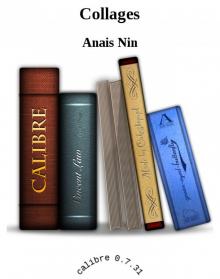 Collages
Collages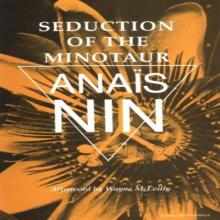 Seduction of the Minotaur
Seduction of the Minotaur Children of the Albatross
Children of the Albatross Delta of Venus
Delta of Venus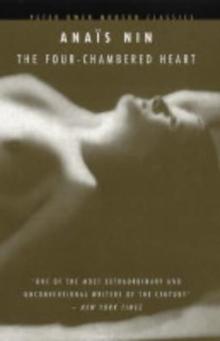 The Four-Chambered Heart coti-3
The Four-Chambered Heart coti-3 Diary of Anais Nin, Volume 2
Diary of Anais Nin, Volume 2 Diary of Anais Nin, Volume 1
Diary of Anais Nin, Volume 1 Diary of Anais Nin, Volume 4
Diary of Anais Nin, Volume 4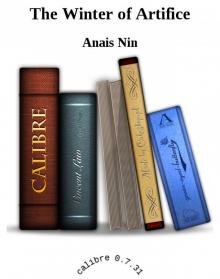 The Winter of Artifice
The Winter of Artifice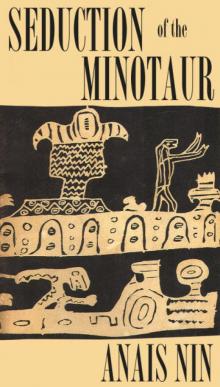 Seduction of the Minotaur coti-5
Seduction of the Minotaur coti-5 Children of the Albatross coti-2
Children of the Albatross coti-2 Henry and June: From A Journal of Love -The Unexpurgated Diary of Anaïs Nin (1931-1932)
Henry and June: From A Journal of Love -The Unexpurgated Diary of Anaïs Nin (1931-1932) Ladders to Fire
Ladders to Fire House of Incest
House of Incest